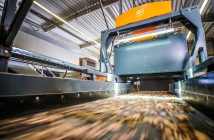With its 2016 acquisition of plastics recycler mtm plastics, Borealis, an Austrian chemicals and plastics group, took a big step towards a circular business model. Its partnership with equipment manufacturer, Lindner, has been key to making that work
Upon meeting Günter Stephan, Head of Mechanical Recycling at Borealis Circular Economy Solutions, it is clear that the company has understood the most pressing issue of our age. In 2016 Borealis became the first big plastics industry player to acquire a plastics recycling company, mtm plastics. Two years later, the Austrian company Ecoplast, another plastics recovery company, joined the Borealis Group.
“We believe plastic is a fantastic material that is far too valuable to waste,” explained Stephan. “That’s why we are working with our partners along the value chain to take concrete measures to implement the circular economy principles on a larger scale in our industry.”
These initiatives are already bearing fruit: the combined know-how results in ever higher-quality regranulate and innovative products such as Purpolen®, a regranulate made of 100% recycled plastics and suitable for manufacturing branded consumer goods.
According to Stephan, mechanical recycling is currently the most eco-efficient method to apply the principles of the circular economy. Borealis also draws on the experience and technology of established recycling companies such as Lindner Recyclingtech, the Austrian specialist in shredding technology and waste processing.
Stefan Scheiflinger-Ehrenwerth, Head of Product Management at Lindner: “In terms of processes, material recovery starts with shredding, sorting and cleaning waste.
As one of the leading suppliers of system solutions in this industry, we know that the economic aspect of the entire process also plays a vital role in the closed-loop economy. That’s precisely why it’s so important to cooperate with companies from all areas of the value chain. Only when all components and processes are well coordinated will it be possible to cost-effectively produce high-quality regranulate that is comparable to virgin material.”
Circumat
The Circumat project group is an example of what such a cooperation might look like. Its members – the Landes-Abfallverwertungsunternehmen LAVU, the Transfercenter für Kunststofftechnik (TCKT), the Johannes Kepler University Linz (JKU) and the industrial partners Erema, Greiner Packaging, Innplast Kunststoffe, Lindner and Borealis with mtm plastics – are aiming to jointly develop technically advanced products made of recyclates to demonstrate new possible areas of application. ‘Recycling Öli’ is their pilot project.
Öli is a multiple-use bucket for the collection of used cooking oil from households and the catering industry in Germany, Austria and Switzerland and was previously made of virgin polypropylene. Thanks to this cooperation, it is now possible to produce buckets made of 100% recycled post-consumer rigid plastic with the same properties as the old containers made of virgin material. For example, the bucket has to retain its shape when 400 kg of compression load are applied, it has to be heat-resistant up to 80 °C and has to have consistent dimensions of ± 1/10 mm. Recycling Öli will gradually replace the existing Öli buckets.
“The Recycling Öli project has clearly demonstrated what waste plastics are capable of thanks to upcycling. In the future we will definitely see even more exciting areas of application and new products made of high-quality recyclates,’ concludes Scheiflinger-Ehrenwerth.




